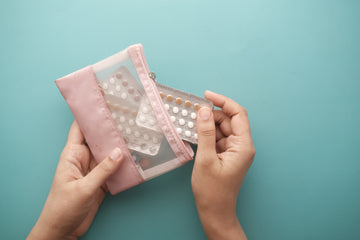
It's no secret that there are some seriously wild myths floating around about women's bodies and fertility. Despite years of scientific research, the female cycle still remains somewhat of a mystery to many, leading to some pretty bizarre theories. That's why we've taken a deep dive into some of the most common fertility myths to separate fact from fiction and provide you with accurate information you can trust. So, sit back and let's explore the truth together!
1. You can get pregnant anytime you have sex.
It's a common misconception, but the truth is that your fertile window is actually much shorter than you might think. During each menstrual cycle, an egg develops inside a follicle until ovulation, when the follicle bursts and releases the egg.
From the moment of ovulation, the egg is fertile and remains so for only 12 to 24 hours. Sperm, on the other hand, can remain fertile for up to 72 hours after ejaculation. This means that you are fertile for a maximum of 72 hours before and 24 hours after ovulation, giving you only three days in your cycle when you can get pregnant. The challenge is identifying these three days, but rest assured that you are no longer fertile 24 hours after ovulation.
2. Ovulation always occurs exactly in the middle of your cycle on day 14.
It's a common misconception, but the truth is that there is no "normal" cycle length. Only about 13% of women have a 28-day cycle, and for most women, ovulation does not occur on day 14. Researchers have analyzed the cycle records of over 100,000 women and found that the average follicular phase, which occurs before ovulation, lasts 16.9 days, while the average luteal phase, which occurs after ovulation, lasts 12.4 days.
This means that the time before ovulation is longer than the time after ovulation for most women. By tracking your cycle and recording various details, you can better understand the length of your individual phases and identify your fertile window. The femSense® app is a great tool to help you track your fertility and cycle-related details.
3. You can't get pregnant while breastfeeding.
Many people believe that breastfeeding is a foolproof method of birth control, but the truth is a bit more complicated. If you are bottle feeding your baby or combining bottle feeding with breastfeeding, your first period could start as soon as 5 to 6 weeks after giving birth, indicating that you are ovulating and can get pregnant. However, women who breastfeed regularly for a long time may find that their cycle takes longer to start again due to the hormone prolactin, which is secreted during breastfeeding and can prevent ovulation.
It's important to remember that you can still be fertile before you get your first period. In fact, your period is an indication that ovulation has already taken place. If you don't want to get pregnant again shortly after giving birth, it's crucial to use some form of contraception, even if you are breastfeeding. There are many safe and effective options available, so talk to your healthcare provider to determine which one is right for you.
4. You'll get pregnant immediately after stopping the pill.
While it's true that you can get pregnant as soon as you stop taking the pill, it's important to remember that your menstrual cycle may be irregular for some time afterward. It takes time for the normal hormone balance to re-establish itself and for ovulation to occur regularly. This can make it difficult to plan a pregnancy because you don't know when your fertile window is.
If you're not ready for a baby, it's important to plan an alternative method of contraception before stopping the pill. On the other hand, if you're hoping to conceive, it's usually advised to stop hormonal contraception a few months before actively trying to get pregnant. This gives your body time to return to its natural cycle and increases your chances of conceiving. Remember, every woman's body is different, so it's always a good idea to discuss your options with your healthcare provider to determine the best course of action for you.
5. Having an orgasm can help you conceive.
Let's talk about orgasms and pregnancy. While it's true that not all women experience orgasm during sexual intercourse, research has shown that having an orgasm can potentially help you get pregnant. Here's why: moisture in the vagina enables sperm to move more quickly towards the uterus, and the contractions of the vagina and womb during orgasm can help propel the sperm towards the egg.
It's important to note that having an orgasm doesn't guarantee pregnancy, but it could increase your chances. While it's necessary for a man to orgasm to fertilize an egg, it's not essential for a woman. However, the contractions that occur during orgasm can create a more favorable environment for sperm to reach the egg.
So, if you're trying to conceive, it's worth keeping in mind that having an orgasm could potentially help. But don't stress if it doesn't happen every time – it's just a "nice to have" for women. As always, if you have any concerns or questions about your fertility, it's best to speak with your healthcare provider.
6. Women ovulate every month.
While it's true that women typically ovulate every month, it's important to remember that there are exceptions to this rule. An anovulatory cycle is a cycle where no egg is released, meaning that pregnancy is not possible. Don't worry – this is perfectly normal and there are several different reasons why a woman might skip ovulation occasionally.In fact, studies show that most women have one or two months per year where they don't ovulate, although they probably won't even notice. It's important to note that just because you had a period doesn't necessarily mean that you ovulated. The bleeding you experience after an anovulatory cycle is technically not a period, but rather an estrogen breakthrough bleed caused by low progesterone levels and a build-up in the lining of the uterus.
If you're using femSense® to measure and confirm your ovulation, you'll have a better understanding of your menstrual cycle and when ovulation occurs. However, if you're not using any tools to track your cycle, you may just think your period is irregular that month. Remember, every woman's body is different, and it's always a good idea to speak with your healthcare provider if you have any concerns about your menstrual cycle.
7. Smoking diminishes fertility.
It's no secret that smoking is bad for your health and it's important to know that it can also have a negative impact on your ability to conceive. The chemicals found in tobacco, which are inhaled while smoking, can reach the ovaries and negatively influence the development of eggs, the maturation of follicles, and the formation of hormones.
But that's not all – smoking has also been shown to reduce blood flow to the uterus, which can further diminish fertility. And here's the kicker: how early in life a woman starts smoking and how many cigarettes she smokes a day can make a big difference in the impact on her fertility.
Unfortunately, even passive smoking can have a negative effect on your fertility. Whether it's a parent who smoked, smoking at work, or your partner smoking a cigarette beside you, exposure to tobacco smoke can harm your chances of conceiving.
So, if you're trying to conceive, it's important to kick the smoking habit – for your health and for your fertility. If you're struggling to quit, speak with your healthcare provider for support and resources to help you on your journey.
8. You can’t get pregnant while you’re on your period.
You may have heard the myth that you can't get pregnant during your period and that you don't need to use contraception. Well, it's time to bust that myth! While it's not common to get pregnant during your period, it's definitely possible and there are a few things you should know.
First of all, women with very short cycles ovulate closer to their period than those with longer cycles. This means that day one of your period is day one of your cycle, and a woman with a very short cycle could ovulate as early as day 8. For women with irregular short cycles, predicting their fertile window can be like a guessing game without a cycle tracker.
But wait, there's more! If a woman ovulates shortly after her period, there may still be sperm in her uterus. Sperm can survive for up to 72 hours after ejaculation, which means that there are sperm still alive and waiting to fertilize the freshly released egg.
So, while it's not easy to get pregnant during your period and it doesn't happen very often, it's definitely not impossible. It's always a good idea to use contraception if you're not trying to conceive, and to speak with your healthcare provider if you have any questions or concerns about your menstrual cycle and fertility.






